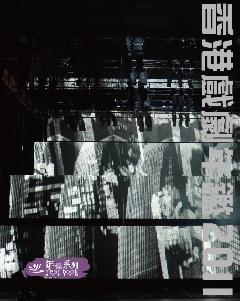Before entering into the theatre, there was an expectation to watch a play about homosexuality. But The Next Generations is actually much more than that. It is more about the interaction of two generations; family and life. It is an experience of exploring feelings for all the audiences.
Interaction
Sometimes what is amazing about theatre is the interaction between the audiences and the actors. In the small theatre, when all the lights are off, the viewers are so close to the actresses it feels like they are involved in the play. The Next Generations is not an exception. Only with a few chairs, a sofa and a fan, the focus is the three ladies – their words, their voice, their gestures and movements. The third scene is brilliant and the distance between the audiences and the actress is minimized. Without a lot of body movement but just two spot lights, people in the darkness focus on the two sisters' dialogues. The power of narrative is actually significant and all of us are able to imagine and create our own story. How did the girls look like when they were small? How was the setting in the village? And what about the farmland? However, some people may find it is boring and dull, or even feel unsettled because of the darkness. That's the fun about art though – different people may have their own understanding.
Michel Foucault(1) proposed the question, “What is an author” suggesting the disappearance of author. The “meaning” and “function” of the text produced by author is usually unstable, over time and places. The readers' interpretation can vary. In the theatre, the script is presented by the director, actresses and the whole crew. Without distraction, all of us are invited to participate and experience the feelings and stories of the characters. There is no boundary between the stage and the seats. In cinemas, the audiences are more like a receiver who can only enjoy what the director and actors provide. But the actresses here become the facilitators who guide us to become part of the play. All of us seem to become the director. What is the script? What does the director's theme? The participants may not be interested in these anymore. In the dark room, every one of us can have our own experience and interpretation.
A play usually has its time limitation and geographical constrain. The script was written nearly twenty years ago in Singapore. However, the play still has its own significance. As the director mentioned, family is something every one of us cannot get rid of. In Hong Kong, fewer people get married, and fewer people give birth, compared with the old times. The storyline is actually very close to us, so the audiences are likely to have strong feelings about the issues being explored in the play. Though, the two-hour play without break can be a bit long for some people.
Experimental
The Next Generations is also trying to tell us what is experimental and spontaneous. It is not completely new in theatre though. The four scenes are presented in four different styles - traditional drama with dialogues, dialogues interact with narrative and movement, spotlight with narrative mainly and film play with still motion. The director is guiding us to explore how different presentations work and react. But the combination of various manners can be a bit awkward in some eyes, or affect the coherence of the whole play. Also, whatever how many rehearsals have done, none would really know how it goes till the show started. The sound effect, for example, is not recorded beforehand. This is important because of the immediate interaction.
It reminds me of Tim Crouch's An Oak Tree(2) last year. The guest actor, Mr Fredric Mao, was invited to be the character and read the script spontaneously. Tim Crouch was guiding him, but also all the audiences to experience the story and the feeling inside.
The Next Generations is more than just a play about homosexuality, or even a story about family. In the theatre, the participants are exploring together, with the actresses and the whole crew. We are encouraged to be more open-minded to different and new experimental styles of acting.
(1) Philip Barker, Michel Foucault: An Introduction, (Edinburgh: Edinburgh University Press, 1998), pp1-3.
(2) “Tim Crouch – England, My arm, An oak tree”, British Council, 12 Dec, 2010 (http://www.britishcouncil.org/hongkong-creativity-and-society-arts-hkaf-2009-timcrouch-2.htm)
「藝評新世代──藝評寫作導領計劃2010」由康樂及文化事務署(新視野藝術節)主辦,國際演藝評論家協會(香港分會)策劃及統籌。
本網站內一切內容之版權均屬國際演藝評論家協會(香港分會)及原作者所有,未經本會及/或原作者書面同意,不得轉載。








